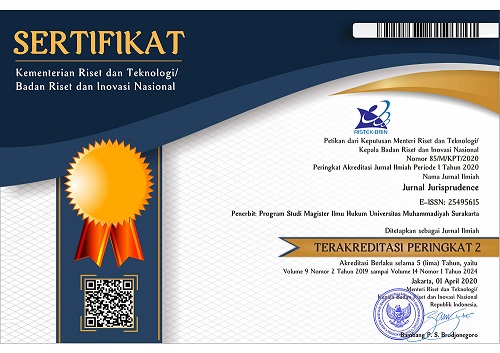Law Enforcement on Terrorism: The Role of Judicial Decisions
DOI:
https://doi.org/10.23917/jurisprudence.v13i2.2672Keywords:
Law enforcement, judicial decisions, terrorism, Social resistance, legal justice, penegakan hukum, keputusan pengadilan, terorisme, perlawanan sosial, keadilan hukumAbstract
ABSTRACT
Purpose of the Study: The repressive law enforcement carried out as a response against the crime of terrorism has caused issues with law enforcement's effectiveness in Indonesia. It was discovered that the normative approach did not cut the chain of terrorism. On the contrary, it created new terrorists. This paper aimed to construct the relationship between law enforcement, judicial decisions, and legal objectives.
Methodology : This research used the dogmatic legal research method by statutory and library approaches. The data of this research were gathered from news and judicial decisions on terrorism cases.
Results : Results suggest that law enforcement, especially normative-repressive judicial decisions, has resulted in new issues, namely society's rampant actions against the state, particularly towards the law enforcement apparatus.
Applications of this Study : This condition will further imply with the rampant actions of state delegitimating in society. In line with that, this paper suggests that a new style of law enforcement should be applied in solving terrorism cases in this country. The said approach is law enforcement who emphasizes the humanity of the suspect, heavily addressing the protection of the suspect's rights in the crime of terrorism.
Novelty/Originality of this study: This is the pilot research discussing judicial decisions in courts concerning terrorist cases in Poso and its surroundings.
Keywords: Law enforcement, judicial decisions, terrorism, social resistance, legal justice.
ABSTRAK
Tujuan Studi: Penegakan hukum represif yang dilakukan sebagai tanggapan terhadap kejahatan terorisme telah menimbulkan masalah dengan efektivitas penegak hukum di Indonesia. Ia menemukan bahwa pendekatan normatif tidak memotong rantai terorisme. Sebaliknya, ia menciptakan teroris baru. Dokumen ini bertujuan untuk membangun hubungan antara penegakan hukum, keputusan pengadilan, dan tujuan hukum.
Metodologi: Penelitian ini menggunakan metode penelitian hukum dogmatis dengan pendekatan undang-undang dan perpustakaan. Data dari penelitian ini dikumpulkan dari berita dan keputusan pengadilan tentang kasus terorisme.
Hasil: Hasilnya menunjukkan bahwa penegakan hukum, terutama keputusan-keputusan pengadilan normatif-represif, telah menghasilkan masalah baru, yaitu tindakan ramping masyarakat terhadap negara, terutama terhadap aparat penegak hukum.
Aplikasi dari Studi ini: Kondisi ini akan lebih menyiratkan dengan tindakan ramping delegitimating negara di masyarakat. Sesuai dengan itu, makalah ini menyarankan bahwa gaya penegakan hukum baru harus diterapkan dalam menyelesaikan kasus terorisme di negara ini. Pendekatan yang disebutkan adalah penegakan hukum yang menekankan kemanusiaan tersangka, dengan serius menangani perlindungan hak tersangka dalam kejahatan terorisme.
Kebaruan/Orisinalitas: Ini adalah penelitian pilot yang membahas keputusan pengadilan di pengadilan mengenai kasus terorisme di Poso dan sekitarnya.
Kata kunci: penegakan hukum, keputusan pengadilan, terorisme, perlawanan sosial, keadilan hukum.
Submitted
Accepted
Published
Issue
Section
License
Copyright (c) 2023 Jurnal Jurisprudence

This work is licensed under a Creative Commons Attribution 4.0 International License.

















